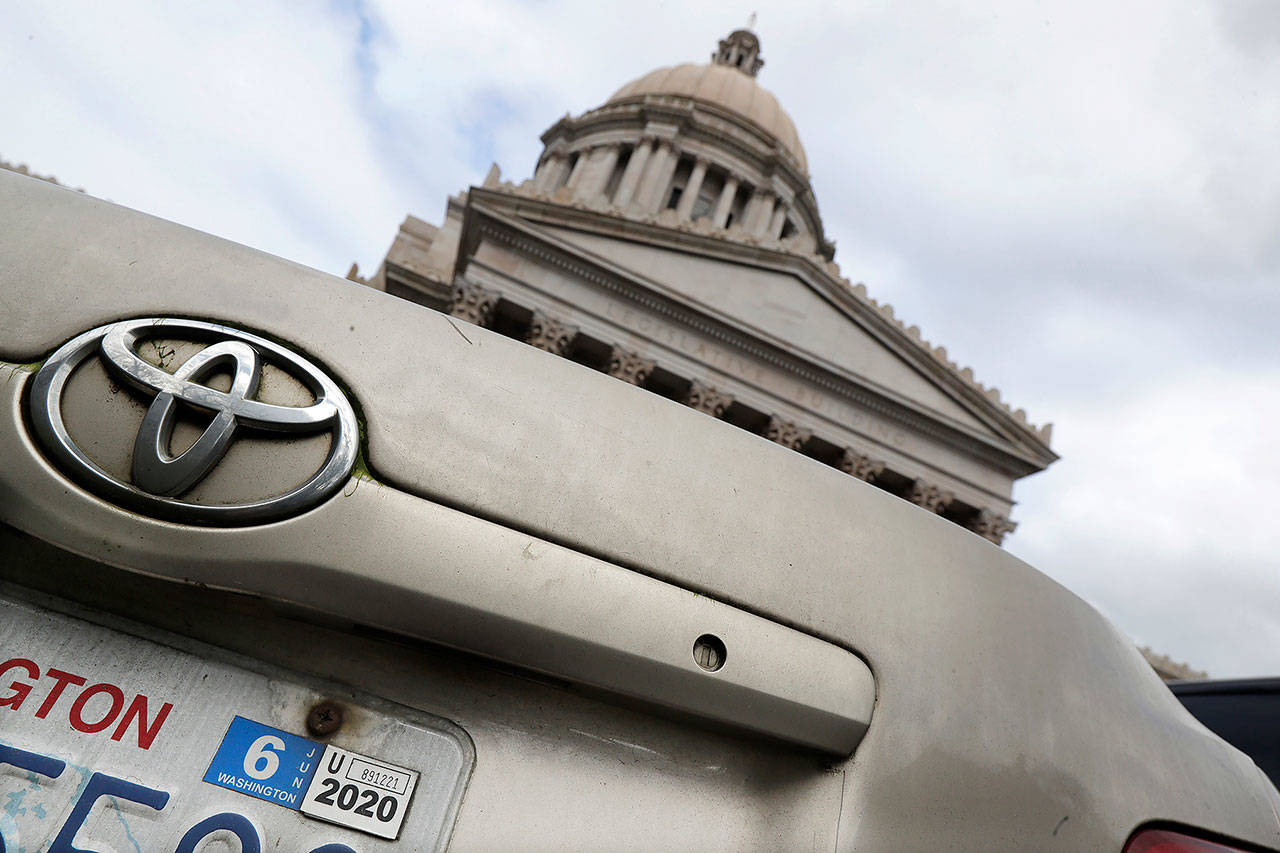OLYMPIA — The fate of Initiative 976 is in the hands of the state Supreme Court.
On Tuesday, justices seemed skeptical the measure to lower car tab fees passed by voters in Snohomish County and across the state eight months ago passes constitutional muster.
In an hour-long hearing, they pressed attorneys for the state, openly concerned whether the measure’s title misled voters and its content covered too many subjects.
At one point the conversation shifted to the assertion of the ballot title that the measure would “limit annual motor-vehicle-license fees to $30.” In actuality, the lowest fee would be $43.25 because certain charges will continue to be collected.
Justice Sheryl Gordon McCloud asked Alan Copsey, a lawyer for the state, whether such wording fooled voters.
Copsey said the notion of $30 car tabs has been debated for a long time and is synonymous with paying less.
“It is not a promise. It is a political characterization,” he said. “I’ve seen the $30 car tab so often … I know it is a phrase for lowering my vehicle registration.”
David Hackett, a King County deputy prosecutor and attorney for opponents, seized on the comment in his closing rebuttal, noting, “you don’t put political phrases in the title.”
Initiative 976, sponsored by Tim Eyman, passed with 53% of the vote in November 2019. And, like Eyman’s previous car tab measures, landed in court quickly.
The measure, if upheld, seeks to limit the annual vehicle registration fee at $30 and axe car tab charges levied by local transportation districts in Everett, Lynnwood and 60 other cities.
It also would slash the motor vehicle excise tax collected by Sound Transit, a pivotal source of revenue to carry out its voter-approved expansion known as ST3. The initiative directs the regional transit authority to retire, refinance or defease some of its outstanding construction bonds and to switch to using vehicle values in Kelley Blue Book when calculating its excise tax.
In November, before all the votes had been counted, a coalition of local governments and public transit agencies sued to block it from ever taking effect.
Earlier this year, they failed to convince a King County Superior Court judge who ruled against many of their arguments. That set the stage for the state high court to settle the questions.
On Tuesday, Hackett and Matt Segal of the Pacifica Law Group, argued the initiative’s constitutional infirmities begin with a flawed ballot title that misled voters by not making clear that its passage would repeal certain voter-backed transportation levies. And the title also failed to mention key pieces such as those dealing with Sound Transit.
Another big problem, they argued, is the initiative tackled multiple subjects and the state Constitution limits initiatives to one topic. Again, Sound Transit’s inclusion is improper as it is a regional entity. Allowing voters around the state to direct it to take certain actions is wrong, they said.
The initiative “violates so many provisions of our Constitution it cannot be upheld,” Hackett told justices.
Copsey, in defending the initiative, said a ballot title is limited in its word count and cannot cite every potentiality. It is intended to give voters a broad understanding and if a voter wants more they’ll take a deeper look, he said.
In this case, he said, it is “an accurate representation of what it does. What they’re asking for is a list of the consequences.”
And, he contended the measure comports with the single-subject rule because all the matters — limits on car tabs, local fees, vehicle excise tax — are “related to one another.”
Eyman, who is running for governor as a Republican, gathered with supporters outside the Temple of Justice ahead of the hearing — which was conducted by video conferencing.
Reached after the hearing, he said, “We were careful this time to make sure we got it right.”
He pointed out King County Superior Court Judge Marshall Ferguson heard the same arguments and concluded most of the initiative should take effect.
“Are there really nine justices to the left of Marshall Ferguson?” he said.
Andrew Villeneuve, executive director of the Northwest Progressive Institute, applauded Hackett and Segal for exposing the measure’s legal weaknesses.
“They came prepared with good arguments that withstood critical questioning by the justices, while the attorneys for the defendants were unable to offer satisfactory responses when their arguments were tested,” he said. “If the Court follows precedent, I-976 will be struck down in a few months.”
Jerry Cornfield: 360-352-8623; jcornfield@heraldnet.com. Twitter: @dospueblos.
Talk to us
> Give us your news tips.
> Send us a letter to the editor.
> More Herald contact information.

























